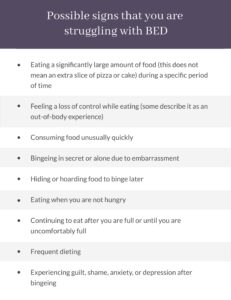What Is Binge Eating Disorder?
By Mandy Parsons
Have you ever felt stuffed after a plateful of food, only to go back for seconds? Do you use vacation as an excuse to indulge in a few too many treats? Ever find yourself mindlessly finishing off an entire bag of chips while watching TV?
There is a difference between occasional overeating and recurrent food binges that spiral out of control.
None of these experiences are out of the ordinary, as we all exhibit unhealthy eating habits every now and then. But there is a difference between occasional overeating and recurrent food binges that spiral out of control.
The National Institute of Mental Health (NIMH) reports that nearly 3% of people have been affected by binge eating disorder (BED) in their lifetime. In fact, BED is the most common and most frequently misunderstood eating disorder in the United States. Affecting both men and women, young and old, adolescents included, BED does not discriminate among racial or economic backgrounds. But what is binge eating disorder?
BED is a potentially life-threatening condition characterized by repeated consumption of large amounts of food due to compulsion. Those with binge eating disorder feel out of control while eating and typically eat way too much, way too quickly. They tend to be ashamed or disgusted after an episode but do not regularly purge to prevent weight gain.
Binge Eating Disorder Symptoms
BED is one of the newest eating disorders formally recognized in the Diagnostic and Statistical Manual of Mental Disorders, Fifth Edition (DSM-5).

BED is unique in that, unlike other eating disorders, those impacted do not often use vomiting, laxatives, diuretics, excessive exercise, or other unhealthy means to compensate for the extra calories.
It’s important to note that just because you binge eat from time to time, that does not mean you have binge eating disorder. Someone with BED usually binges at least once a week for three months, and the ongoing behavior significantly impacts their mental or physical health.
What Causes Binge Eating Disorder?
BED is a complex disorder with various underlying causes, including societal pressures, emotional triggers, and psychological and genetic factors.
For example, those who have ever been shamed because of their weight, or feel pressure to be a certain size for any reason, may perpetually diet. That constant focus on food, or lack thereof, can result in a vicious cycle of restricting and bingeing.
Others binge to cope with emotions triggered by trauma or abuse. Eating is comforting and serves as a means of dealing with difficult circumstances. Boredom is another uncomfortable feeling that causes people to binge eat.
Psychology also plays a key role in BED, as many individuals with eating disorders suffer from mental health issues as well. According to Johns Hopkins Medicine, there is believed to be a link between eating disorders and depression. Likewise, “biochemical similarities have been discovered between people with eating disorders and obsessive-compulsive disorder (OCD).”
Finally, experts believe that those with a family history of an eating disorder like BED may be more susceptible.
Health Effects of Binge Eating Disorder
There are implications beyond those related to weight. BED affects your overall quality of life.
The National Eating Disorders Association (NEDA) reports that up to two-thirds of individuals with BED are clinically obese. Obesity puts you an at increased risk for a number of physical health complications including heart disease, diabetes, high cholesterol and blood pressure, gastrointestinal problems, as well as some types of cancer.
But there are implications beyond those related to weight. Binge eating disorder affects your overall quality of life. You may experience problems at work or home, withdraw from social situations, or struggle with substance use.
Furthermore, as previously mentioned, binge eating disorder is associated with mood disorders and psychiatric illness.
Can Binge Eating Disorder Treatment Help?
NEDA reports that an estimated 43.6% of people with BED will receive treatment in their lifetime. Fortunately, there are many options for binge eating disorder treatment.
Cognitive behavioral therapy (CBT), interpersonal psychotherapy, and support groups are the most common. CBT, for instance, focuses on helping you identify the negative thinking patterns around your problematic behavior, equipping you with helpful and productive coping strategies.
Pharmacologic treatment is another option for binge eating disorder. Healthcare providers have found that medications used in managing other conditions, like depression, are effective in treating eating disorders as well.
BED is best treated with the help of a trained professional like those here at The Meadows Ranch. We specialize in helping women overcome binge eating disorder — or any other disordered eating problem — by uncovering the complex psychological factors contributing to their unhealthy relationship with food.
Please reach out today to learn more and take the first step to experiencing the freedom you deserve.

